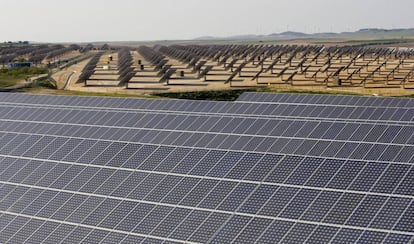Spain’s Supreme Court backs renewable energy cuts
Decision finds that €1.7 billion drop in subsidies was legal, but government still faces dozens of claims in arbitration agencies

The Spanish Supreme Court has dealt a new blow to renewable energy producers.
In a ruling, the court backed the 2014 government decree that resulted in cuts of nearly €1.7 billion in subsidies for the sector.
The decision is a setback for the three producers who fought the legal battle against the Spanish government
The court finds that the decree, passed by Mariano Rajoy of the Popular Party (PP), does not violate the Spanish Constitution or EU legislation, as the plaintiffs claimed.
The decision, which confirms an earlier ruling by the Constitutional Court, is a setback for the three producers who fought the legal battle against the Spanish government: Ingeniería Civil, Alternativa y Medioambiental (Incam), Renovables Samca and Llerena Solar, Temcli y Powersol 2007.
But hundreds more similar appeals have reached the Supreme Court, which is expected to rule along the same lines in the coming months.
The one piece of good news for producers is that the new premiums are not retroactive, so that past subsidies do not have to be returned.
Waiting for ICSID
Despite the favorable rulings for the Spanish government, the legal battle over the cuts to renewable subsidies is not over.
Dozens of companies and investment funds have turned to the International Centre for Settlement of Investment Disputes (ICSID), a World Bank-sponsored arbitration agency, with claims against Spain. Those decisions are still pending.
But in January, another claim at the Arbitration Court of the Stockholm Chamber of Commerce ended in Spain’s favor.
English version by Susana Urra.
Necessary cuts?
The legislative changes to conditions for investment in renewable energies were rushed through parliament by royal decree, as Spain sought to contain its ballooning deficit in the middle of the economic crisis.
Calculations indicate that Spain was paying excessive premiums and subsidies to thermosolar and photovoltaic producers, and that such premiums, in excess of market rates, were one of the causes of the unrelenting rise in the tariff deficit – the difference between the cost of producing electricity and what Spanish consumers are actually charged for it.
Spain has the fourth-highest electricity costs in Europe – around €80 per person a month.
Tu suscripción se está usando en otro dispositivo
¿Quieres añadir otro usuario a tu suscripción?
Si continúas leyendo en este dispositivo, no se podrá leer en el otro.
FlechaTu suscripción se está usando en otro dispositivo y solo puedes acceder a EL PAÍS desde un dispositivo a la vez.
Si quieres compartir tu cuenta, cambia tu suscripción a la modalidad Premium, así podrás añadir otro usuario. Cada uno accederá con su propia cuenta de email, lo que os permitirá personalizar vuestra experiencia en EL PAÍS.
¿Tienes una suscripción de empresa? Accede aquí para contratar más cuentas.
En el caso de no saber quién está usando tu cuenta, te recomendamos cambiar tu contraseña aquí.
Si decides continuar compartiendo tu cuenta, este mensaje se mostrará en tu dispositivo y en el de la otra persona que está usando tu cuenta de forma indefinida, afectando a tu experiencia de lectura. Puedes consultar aquí los términos y condiciones de la suscripción digital.









































